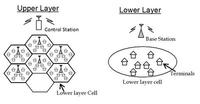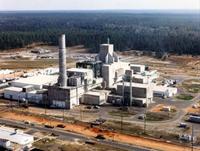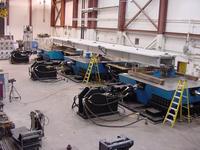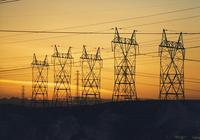-
Underground recovery process at WIPP begins
Nuclear Waste Partnership (NWP), the management and operations contractor at the Waste Isolation Pilot Plant (WIPP) for the U.S. Department of Energy (DOE), said it has initiated the first phase of an underground recovery process which will lead to the resumption of nuclear waste disposal operations at WIPP. Initial results show no airborne radioactive contamination in the underground shafts.
-
-
Determining long-term effects of West Virginia chemical spill
A chemical mixture called crude 4-methylcyclohexane methanol (MCHM) is used during the separation and cleaning of coal products. More than 10,000 gallons of the chemical leaked from a storage tank near Charleston, West Virginia, and entered the river upstream of a water-treatment plant on 9 January. The drinking water of more than 300,000 West Virginians was contaminated. Water restrictions began to be lifted on 13 January, but residents are still detecting the telltale odors of MCHM. Virginia Tech faculty engineers and students are unravelling fundamental chemical and health properties of MCHM.
-
-
“Encouraged” bacteria cleaning up more effectively after oil spills
Bioremediation is nature’s way of cleaning up. Plants, bacterial decomposers, or enzymes are used to remove contaminants and restore the balance of nature in the wake of pollution incidents. What is surprising is that given the right kind of encouragement, bacteria can be even more effective. Researchers in Norway have achieved surprising results by exploiting nature’s own ability to clean up after oil spills.
-
-
New technique allows better monitoring of water quality
Researchers have developed a new technique that uses existing technology to allow researchers and natural resource managers to collect significantly more information on water quality to better inform policy decisions. In addition to its utility for natural resource managers, the technique will also allow researchers to develop more sophisticated models that address water quality questions.
-
-
FERC orders development of physical security standards for transmission grid
The Federal Energy Regulatory Commission (FERC) on Friday directed the North American Electric Reliability Corporation (NERC) to develop reliability standards requiring owners and operators of the Bulk-Power System to address risks due to physical security threats and vulnerabilities.
-
-
2011 Oklahoma human-induced earthquake may have triggered larger quake
In a new study, scientists observed that a human-induced magnitude 5.0 earthquake near Prague, Oklahoma in November 2011 may have triggered the larger M5.7 earthquake less than a day later. This research suggests that the M5.7 quake was the largest human-caused earthquake associated with wastewater injection.
-
-
Accelerated urbanization exposes French cities to increased seismic risk
Old structures, designed before current seismic building codes, abound in France, and there is insufficient information about how they will respond during an earthquake. French researchers have looked into data mining to develop a method for extracting information on the vulnerability of cities in regions of moderate risk, creating a proxy for assessing the probable resilience of buildings and infrastructure despite incomplete seismic inventories of buildings. The research exposes significant vulnerability in regions that have experienced an “explosion of urbanization.”
-
-
Safeguarding networks when disasters strike

Disasters both natural and human-caused can damage or destroy data and communications networks. Several presentations at the 2014 OFC Conference and Exposition, being held 9-13 March in San Francisco, will present new information on strategies that can mitigate the impacts of these disasters. Researchers created an algorithm that keeps data safe by moving or copying the data from data centers in peril to more secure locations away from the disaster. The algorithm assesses the risks for damage and users’ demands on the network to determine, in real-time, which locations would provide the safest refuge from a disaster. Other researchers suggest that if fiber-optic cables are down, wireless communication can fill the void and be part of a temporary, emergency network. For such a system to work, however, wireless technology would have to be integrated with the fiber-optic network that transports data around the world.
-
-
Virtual lab for nuclear waste repository research
A nuclear waste repository must seal in radioactive waste safely for one million years. Researchers currently have to study repositories and their processes in real underground laboratories, but a virtual underground laboratory will soon simplify their work.
-
-
Energy Department suspends work on controversial plutonium reprocessing project

The Obama administration has decided to put on hold its plans to complete construction on a South Carolina reprocessing facility which would convert nuclear weapon-grade plutonium into reactor fuel. The suspension of work on the project is part of the fiscal 2015 budget plan the administration unveiled Tuesday. The project has been hobbled by delays and massive cost-overruns, and experts says security and safety concerns have not been adequately addressed.
-
-
Large shake tables expands capabilities of U Nevada, Reno’s quake engineering lab

When it opens, the University of Nevada, Reno’s new Earthquake Engineering Laboratoryt will join with the internationally renowned Large-Scale Structures Laboratory to comprise the largest and most versatile structural engineering experimental facility in the United States. Researchers at the facility will conduct research aiming to test new designs and materials that will make buildings, bridges, and highways safer.
-
-
Experts call for a new organization to oversee grid’s cybersecurity

In 2013, U.S. critical infrastructure companies reported about 260 cyberattacks on their facilities to the federal government. Of these attacks, 59 percent occurred in the energy sector. A new report proposes that energy companies should create an industry-led organization to deflect cyber threats to the electric grid. Modeled after the nuclear industry’s Institute of Nuclear Power Operations, the proposed organization, to be called the Institute for Electric Grid Cybersecurity, would oversee all the energy industry players that could compromise the electric grid if they came under a cyberattack.
-
-
Operator set to close three Illinois nuclear power plants

Abundant natural gas and growing reliance on solar and wind energy have been steadily eroding the profit margins of nuclear energy. Last year operators have shut down four nuclear plants in the United States last year. Exelon Corporation, which operates six nuclear plants in Illinois, has notified Illinois state regulators that legislative actions may be necessary to keep half of its Illinois nuclear plants from closing, since current market forces make it impossible to continue the operation of the plants profitably.
-
-
Flood risk in Europe could double by 2050
Losses from extreme floods in Europe could more than double by 2050 because of climate change and socioeconomic development. Floods in the European Union averaged 4.9 billion euros a year from 2000 to 2012. These average losses could increase to 23.5 billion euros by 2050. In addition, large events such as the 2013 European floods are likely to increase in frequency from an average of once every sixteen years to a probability of once every ten years by 2050. Understanding the risk posed by large-scale floods is of growing importance and will be a key for managing climate adaptation.
-
-
What use are apps when your web infrastructure is underwater?
This winter has seen unprecedented high winds and flooding resulting in widespread and in some cases, long-lasting power outages in the United Kingdom, particularly in the west of England. Time and time again, companies have advised their customers to go online to check their Web sites for the latest information. Some organizations have even created apps specifically designed to assist flood victims; others have established Facebook self-help groups. There is a fundamental problem here: There are two primary ways in which we gain access to the Web, via a landline and using a mobile connection. Within our homes the landline connects to a wireless router and also, for a lot of homes, a cordless telephone, both of which need electrical power to work. So, when the lights go out, your router and cordless phones are useless. The result is that at times of crisis, the customers in most need are often the ones with no access.
-
More headlines
The long view
Water Wars: A Historic Agreement Between Mexico and US Is Ramping Up Border Tension
As climate change drives rising temperatures and changes in rainfall, Mexico and the US are in the middle of a conflict over water, putting an additional strain on their relationship. Partly due to constant droughts, Mexico has struggled to maintain its water deliveries for much of the last 25 years, deliveries to which it is obligated by a 1944 water-sharing agreement between the two countries.
Trump Is Fast-Tracking New Coal Mines — Even When They Don’t Make Economic Sense
In Appalachian Tennessee, mines shut down and couldn’t pay their debts. Now a new one is opening under the guise of an “energy emergency.”
Smaller Nuclear Reactors Spark Renewed Interest in a Once-Shunned Energy Source
In the past two years, half the states have taken action to promote nuclear power, from creating nuclear task forces to integrating nuclear into long-term energy plans.
Keeping the Lights on with Nuclear Waste: Radiochemistry Transforms Nuclear Waste into Strategic Materials
How UNLV radiochemistry is pioneering the future of energy in the Southwest by salvaging strategic materials from nuclear dumps –and making it safe.
Model Predicts Long-Term Effects of Nuclear Waste on Underground Disposal Systems
The simulations matched results from an underground lab experiment in Switzerland, suggesting modeling could be used to validate the safety of nuclear disposal sites.
